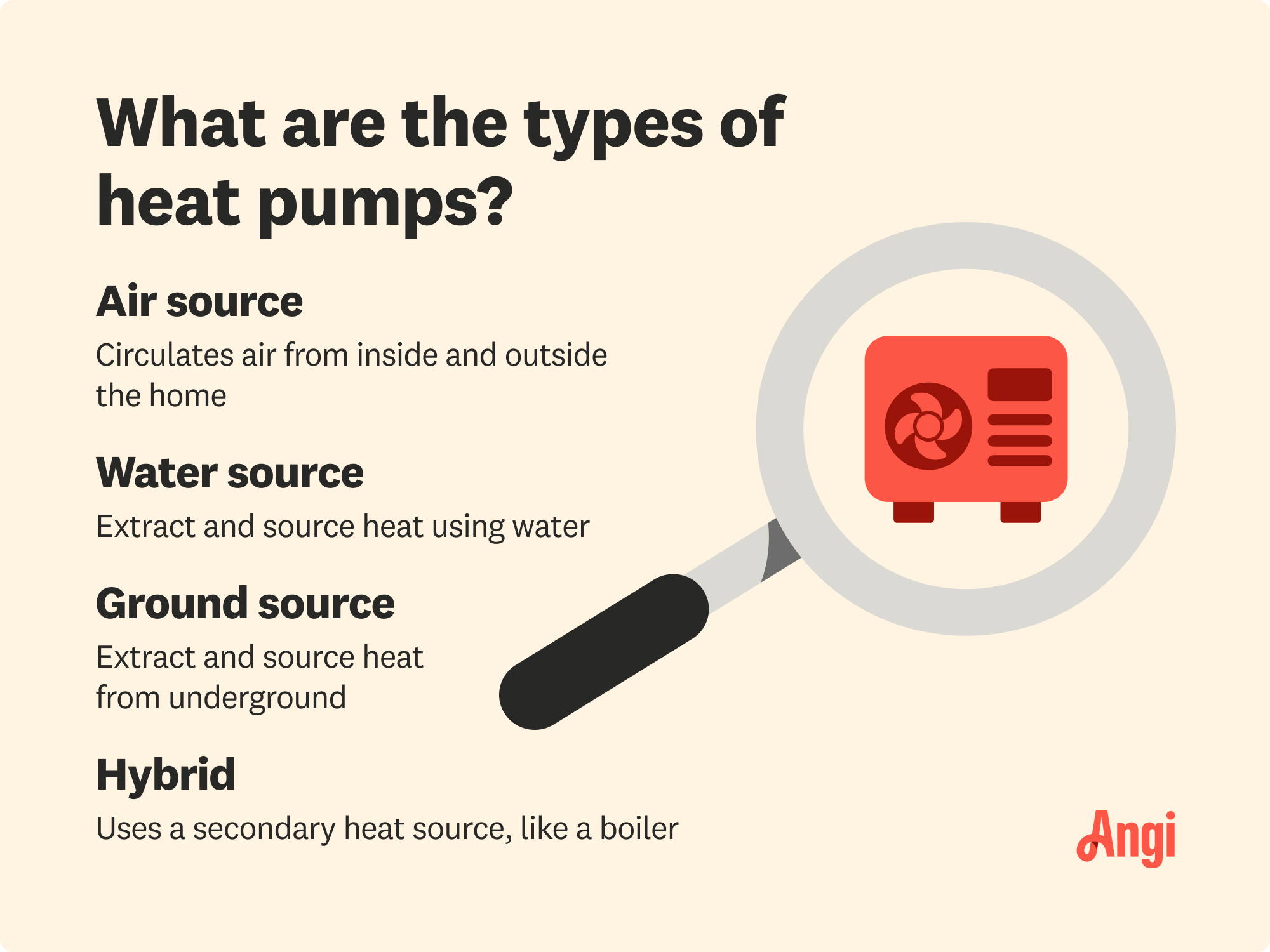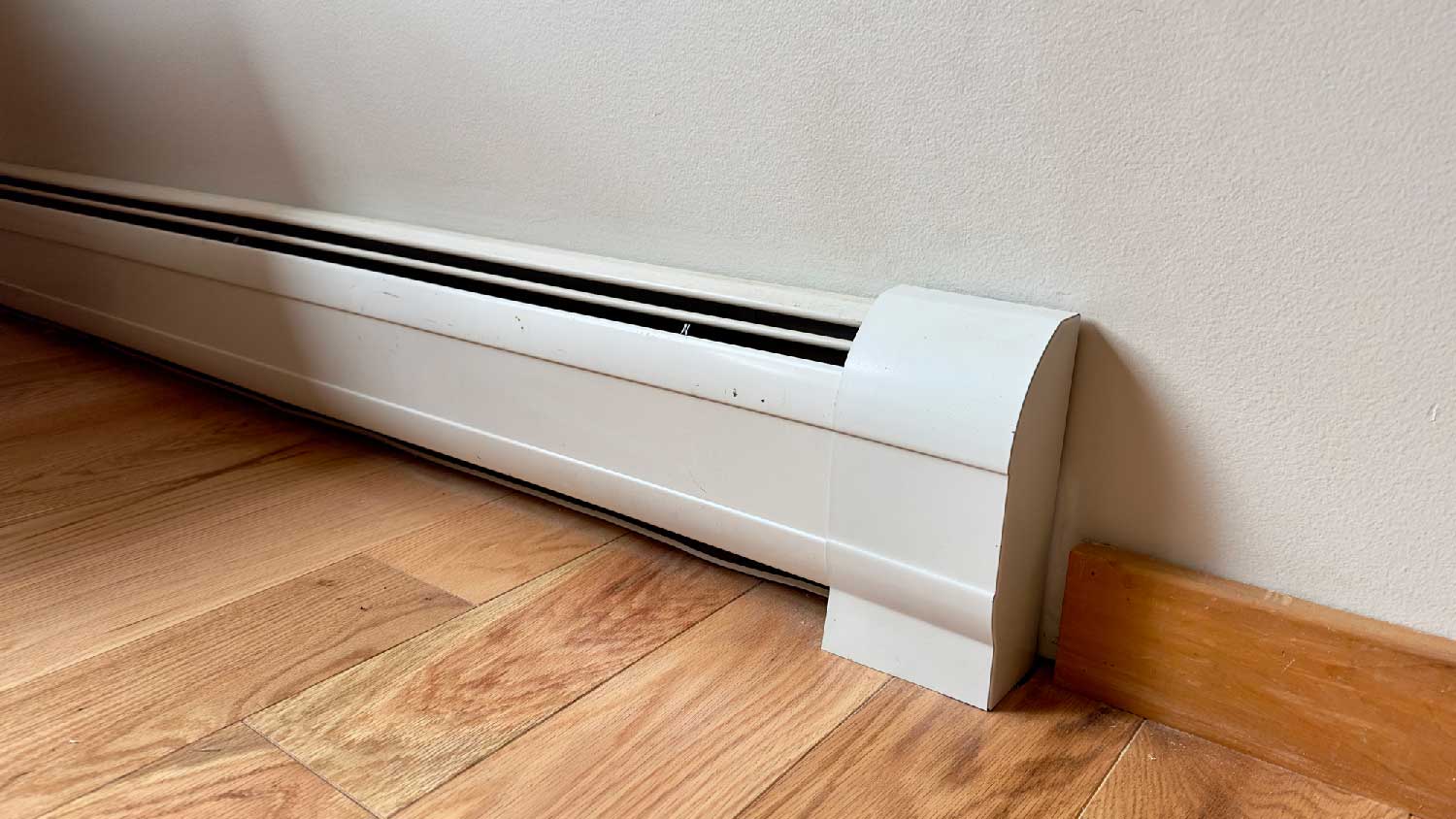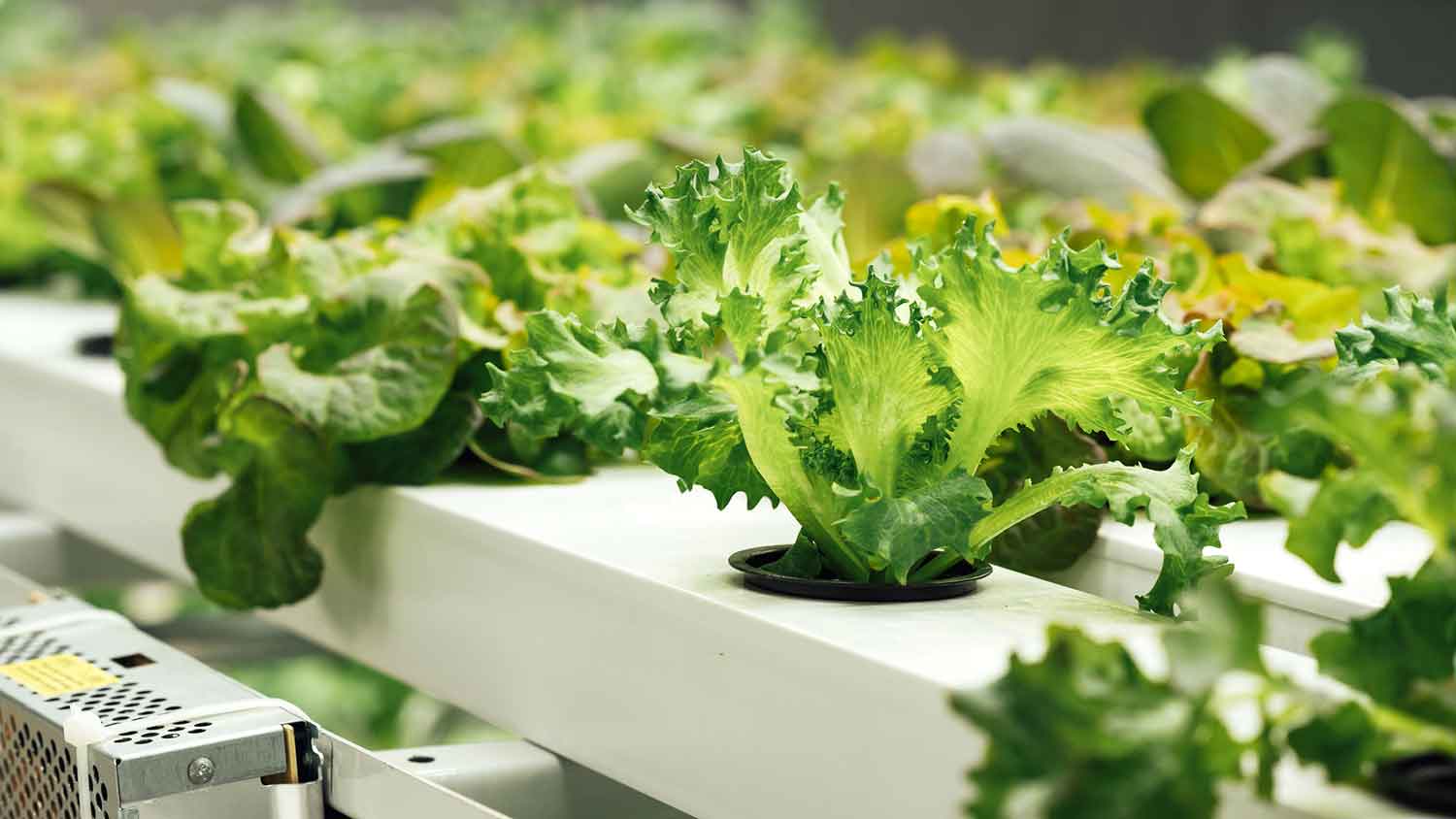
Springing for HVAC maintenance costs may seem like an extra—and easy-to-ignore—item on your checklist, but it will save you money in the long run.
Keep cool or warm all year long with heat pumps


Choosing the right type of heat pump will ensure that you can enjoy your home’s temperature year-round, regardless of the weather outside. If you’re considering heat pumps, you may have noticed that there are a lot of options to choose from. Read on to find out more about the different types of heat pumps available to you and when to hire a local heat pump professional.

Wondering which type of heat pump to install? According to Angi data, 66% of customers have an air-source heat pump, making it the most popular among homeowners. Other common types of heat pumps include water source and ground source.
Talk with your heat pump installer about the best choice for your home.
Air-source heat pumps use the air in and around your home to heat and cool it. In the winter, these units pull the heat from the air outside and bring it inside. And in the summer, the heat pump pulls the heat from inside your house and takes it outside.
This is the most commonly installed type of heat pump on the market. Ducted heat pumps cost $4,500 to $8,000.
If you’re looking for a straightforward and quick installation, mini-splits are usually the best option out of all the different types of heat pumps. You install the compressor and condenser outside, while the main unit goes inside.
These are also ductless, which gives you a lot of flexibility on where you want to install the unit. Additionally, mini-splits can be multi-zone systems. You can expect to pay $1,300 to $8,000 for mini-splits.
| Pros | Cons |
|---|---|
| Flexibility with installation | High upfront cost |
| High energy efficiency | Noisier |
| Low maintenance | Less efficient in cold climates |
Best for: New homes in moderate climates
While air-source heat pumps extract heat from the air, water-source heat pumps extract and disperse heat via water. This system requires you to take advantage of a large body of water nearby, like a lake, river, aquifer, or ocean. This heat pump type is not commonly used in residences and runs from $10,000 to $20,000.
| Pros | Cons |
|---|---|
| Consistent performance | High upfront cost |
| Longer lifespan | Must have access to major water source |
| Sustainable | May require a permit |
Best for: Modern, energy-efficient homes with a well, lake, river, or pond
Ground-source heat pumps, also called geothermal heat pumps, use the earth to absorb and disperse heat. Temperatures change a lot on the surface, but they’re fairly stable 10 feet beneath the ground. Pipes or ground loops are installed underground with heat-transferring liquid inside. This allows the unit to pull or disperse heat into and from the ground, which is carried into the home for heating or cooling.
The complex installation means you’ll have higher up-front costs compared to air-source units, as these systems cost $6,000 to $20,000. However, the long-term advantages often outweigh the costs. They last twice as long as air-source heat pumps and can help decrease your utility bills by a whopping 70%.
| Pros | Cons |
|---|---|
| Durable | High cost upfront |
| Quiet | Complex installation |
| Provide heating and cooling | Risk of contaminating water or soil |
Best for: Homes in extreme climates with ample land
Hybrid heat pumps are sometimes called dual-fuel heat pumps. These systems combine both your heat pump and a second heating system, like a furnace or boiler. So whenever the temperature dips below a certain threshold, the system switches from using the heat pump to a furnace or boiler.
This is a great option for you if you live in an area that gets below freezing on a regular basis. While some heat pump systems can handle very low temperatures, others cannot. So being able to switch to a furnace or boiler means you’ll enjoy cozy warm temps on the coldest of winter days. This option is available for air and ground-source heat pumps and costs $2,500 to $10,000.
| Pros | Cons |
|---|---|
| Lower energy bills | Expensive to install |
| Long life expectancy | High maintenance |
| Sustainable | Requires more space |
Best for: Well-insulated homes in regions with fluctuating temperatures

In addition to choosing between air, water, and ground-source heat pumps, there are several heat pump sub-types to consider. Once you’ve looked at your options, you should consult and hire a heat pump installer near you to make sure that the heat pump type you’re leaning toward will work well for your home.
One of the biggest decisions you’ll need to make is whether you want a ductless, ducted, or short-run ducted system. Not all types of heat pumps are compatible with each type. For example, ground-source and water-source heat pumps require ducts.
Ductless heat pumps don’t require a ducting system, so you can install the unit anywhere in your home. The downside is that you’ll need to install separate indoor units for every room that you want to heat or cool.
Ducted systems require ducts. These systems are whole-home systems and are typically more powerful than ductless ones. It can be costly to install ducts in a home if you don’t have them already, but if you already have ducts, it’ll be a better choice for you to go with a ducted heat pump system.
Short-run ducted systems are the middle ground between ductless and ducted. These systems are ducted, but only in a limited area in your home.
Single-zone heat pumps heat and cool just one room in your home. You’ll have one outdoor unit and one indoor unit.
On the other hand, multi-zone heat pumps allow you to connect four to eight (or more) indoor units to one outdoor unit. You can use these for ducted or ductless systems, although it’s most commonly used for ductless units. You can set varying temperatures throughout the house depending on factors like occupancy and time of day.
Single-stage heat pumps only have two settings: on and off. Two-stage heat pumps have high, low, and off settings. The most sophisticated option is a variable-speed system because it will adjust its power output from between 25% to 100% of its capacity depending on factors like temperature and humidity.
Variable-speed pumps allow you to save on your electric bills and give you the most control over temperature and humidity levels in your home.
Your air, water, and ground-source heat pumps run on electricity. However, there are other energy options available, depending on your heat pump type.
You may be able to couple solar power with your air-source or ground-source heat pumps to save money on your electric bills. Whether you’ll be able to successfully use solar to power your heat pump depends on how much electricity you can generate.
As a general rule of thumb, you’ll need to generate 1,500 watts of power per every 1 ton of your heat pump rating. To achieve this, you can expect to pay $18,000 to $39,000 just for the solar panels.
While air-source heat pumps are usually powered by electricity, air-source absorption heat pumps are powered by other energy sources, including natural gas and propane. Sometimes, people use solar or geothermal-heated water, but natural gas is the most common.
From average costs to expert advice, get all the answers you need to get your job done.

Springing for HVAC maintenance costs may seem like an extra—and easy-to-ignore—item on your checklist, but it will save you money in the long run.

Whole-house humidifier costs vary based on the type and size of the unit, along with other factors. The price might be worth it for people living in dry regions.

The average boiler installation cost depends on size, system type, and other factors. Keep reading to learn the cost of a new boiler.

Discover the average wall heater installation cost, key price factors, and expert tips to help you budget and save on your next home heating project.

If your furnace is making loud noises, it could be the first sign something is failing. This guide will go over some of your furnace’s most noisy issues.

Tackling unwanted odors from indoor plants can be tricky. Learn how to use a carbon filter in your duct fan to improve air quality.